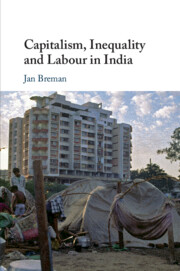Book contents
- Capitalism, Inequality and Labour in India
- Capitalism, Inequality and Labour in India
- Copyright page
- Contents
- Figures
- Preface
- Acknowledgements
- Part I Labour as Codified in the Annals of the State
- Part II Destitute in Bondage
- 3 The Commodification of Agricultural Labour
- 4 The Class Struggle Launched and Suppressed
- 5 The Gandhian Road to Inclusion in Mainstream Society
- Part III The Political Economy of Boundless Dispossession
- Part IV Conclusion
- References
- Index
5 - The Gandhian Road to Inclusion in Mainstream Society
from Part II - Destitute in Bondage
Published online by Cambridge University Press: 29 July 2019
- Capitalism, Inequality and Labour in India
- Capitalism, Inequality and Labour in India
- Copyright page
- Contents
- Figures
- Preface
- Acknowledgements
- Part I Labour as Codified in the Annals of the State
- Part II Destitute in Bondage
- 3 The Commodification of Agricultural Labour
- 4 The Class Struggle Launched and Suppressed
- 5 The Gandhian Road to Inclusion in Mainstream Society
- Part III The Political Economy of Boundless Dispossession
- Part IV Conclusion
- References
- Index
Summary
The study I made of the halipratha system began when I came to south Gujarat at the beginning of the 1960s. My anthropological fieldwork focused on the connection between the polar ends of the village hierarchy: at the top the dominating caste-class of landowners and at the bottom the tribal workforce of landless labourers. The master-servant relationship figured in that polarized interface in a major way, but I realized while doing my rounds in the selected research locations that my immediate findings needed to be contextualized within a longer time span: to make sense of the bondage still going on I would have to trace the practice of servitude back to the colonial setting and perhaps to an even earlier epoch. My Ph.D. thesis described and analysed the political economy at the local level in a historical perspective. I came back to south Gujarat in the summer of 1971 for a second run of research and stayed until the end of 1972. The English translation of my thesis (1974) included an additional final chapter that discussed the changes I found on my return to the sites of my previous enquiries. On the basis of this new spell of fieldwork I concluded that the progressive decline of the hali system took the form of an erosion of patronage features in the interaction between the landowners and landless labourers. My opinion on the fading away of the earlier system of bondage was strengthened by taking stock of events in the decade that had passed since my first round of investigations.
- Type
- Chapter
- Information
- Capitalism, Inequality and Labour in India , pp. 124 - 144Publisher: Cambridge University PressPrint publication year: 2019



